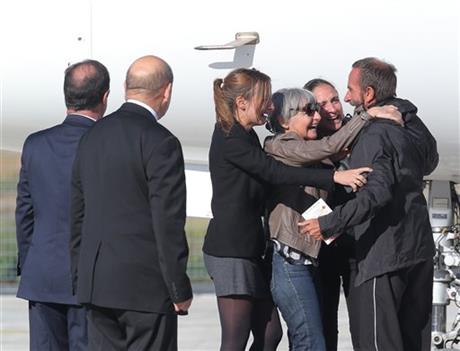
By SARAH DiLORENZO
Released French hostage Daniel Larribe, right, is surrounded by his wife and two daughters as French President, Francois Hollande, left, and defense minister, Jean-Luc Le Drian, second left, look on after Larribe’s arrival at Villacoublay military airbase, outside Paris, Wednesday, Oct. 30, 2013. Four Frenchmen held hostage by al-Qaida militants have landed in France on Wednesday after three years in captivity in the punishing African Sahel. (AP Photo/Michel Euler)
PARIS (AP) — Four Frenchmen held hostage by al-Qaida militants landed in France on Wednesday after three years in captivity in the punishing African Sahel.
The wife and daughters of one hostage, Daniel Larribe, rushed to hug him, and the three held each other while crying. Other friends and family snapped photos of their loved ones finally home.
President Francois Hollande greeted each of the hostages on the tarmac at a military airport outside Paris.
At the time of their capture, the four — Pierre Legrand, Thierry Dol, Marc Feret and Larribe — were working in Arlit, Niger, where the French state-controlled nuclear giant Areva operates a uranium mine. They were retrieved in northern Mali on Tuesday.
Both countries are in the Sahel, the arid region that stretches from the Atlantic Ocean to the Red Sea just south of the Sahara Desert that is prowled by militants from al-Qaida in the Islamic Maghreb.
The former hostages spent their first night of freedom in the Niger capital, Niamey, and left for Paris early Wednesday morning. Foreign Minister Laurent Fabius and Defense Minister Jean-Yves Le Drian had flown to Niger to pick them up. Fabius joked that some of the men slept on the floor of their rooms, finding the mattresses too soft after their ordeal.
Francoise Larribe told reporters how Daniel survived the detention. Francoise herself was captured along with her husband and the other three but was released more than a year ago.
“I think Daniel on his part had a desire to resist, and he did it in a completely formidable way,” she said. “It’s like what we used to say to each other when we were in captivity together: every day is a victory.”
Amid the immense joy of the homecoming, Hollande recalled that there are still seven French citizens being held hostage, three in Africa and four in Syria.
“Today it’s joy for the four families, for our four ex-hostages, but it is still an unbearable wait for other families and for other hostages,” he told reporters from the tarmac.
None of the men wanted to speak after Hollande, and some were made visibly uncomfortable by the intense media attention, hanging their heads and shifting from foot to foot behind the president as he spoke.
Also hanging over the homecoming were questions about why the men were taken captive in the first place and whether a ransom was paid to secure their release. The global intelligence company Stratfor estimates that al-Qaida in the Islamic Maghreb, or AQIM, has carried out at least 18 kidnappings since 2003, raising an estimated $89 million in ransom payments.
Pascal Lupart — who, as head of an association representing friends and families of the hostages, is in touch with those investigating the case — said he was told that Areva paid a ransom for the captives. He did not know the amount, however.
While analysts say that France has previously paid ransoms to free its citizens, Hollande announced earlier this year that the country would no longer pay to secure the release of hostages. He and several other members of the government have since reiterated that no ransom was paid in this case. An Areva press officer, Julien Duperray, also said on Wednesday that no ransom was paid.
There are also questions about how the hostages were taken from Arlit, despite substantial security. Alain Legrand said that while he was thrilled at the release of his son, Pierre, he would be looking for explanations.
“My son is 28. He’s spent more than one of every 10 days of his life in captivity. I would like someone to explain to me why,” he told French television.
_____
Associated Press writer Rukmini Callimachi contributed to this report from Dakar, Senegal.



